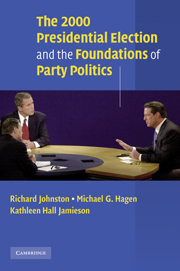Book contents
- Frontmatter
- Contents
- Acknowledgments
- 1 Introduction
- 2 The Evolution of Vote Intentions
- 3 The Landscape
- 4 Ads and News: The Campaign as a Natural Experiment
- 5 The Economy, Clinton, and the First Phase
- 6 Candidate Traits and the Second Phase
- 7 Social Security and the Third Phase
- 8 Conclusions
- Appendix
- References
- Index
7 - Social Security and the Third Phase
Published online by Cambridge University Press: 28 May 2010
- Frontmatter
- Contents
- Acknowledgments
- 1 Introduction
- 2 The Evolution of Vote Intentions
- 3 The Landscape
- 4 Ads and News: The Campaign as a Natural Experiment
- 5 The Economy, Clinton, and the First Phase
- 6 Candidate Traits and the Second Phase
- 7 Social Security and the Third Phase
- 8 Conclusions
- Appendix
- References
- Index
Summary
In the last weeks of the campaign, Al Gore staged a recovery, one fueled in large part by a single issue. That issues provided the impetus is itself a remarkable fact. George W. Bush tried from the start to occupy the center in issue perceptions, especially on the New Deal/Great Society agenda traditionally owned by the Democrats. It was not obvious that a Republican candidate could capture traditionally Democratic ground, for such a strategy runs contrary to predictions from theories of “issue ownership” (Simon 2002). But the Gore campaign evidently concluded that Bush had succeeded, for Gore came to see his task as pushing Bush back to the ideological right, perceptually speaking. In particular, Gore sought to persuade voters that a key Bush proposal, a plan to reform Social Security, far from securing the program's future, profoundly threatened it. Gore succeeded, but only incompletely.
What this chapter shows is the specific manifestation among issues of the tug-of-war between news and ads described in general terms in Chapter 4. The account begins with each side's initial rhetoric on the issue. At the Republican convention, Bush delineated his plan for Social Security in some detail; at the Democratic convention, Gore voiced his opposition. But for some time thereafter, neither side devoted much attention to the issue, at least in advertising. At the first debate, that changed as Gore launched an energetic attack on the Bush proposal.
- Type
- Chapter
- Information
- Publisher: Cambridge University PressPrint publication year: 2004



